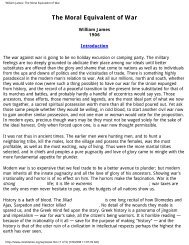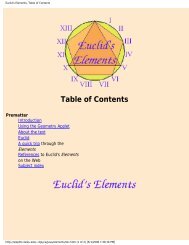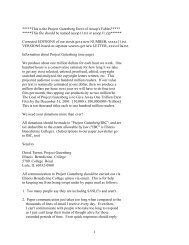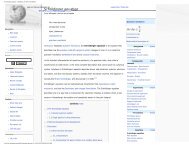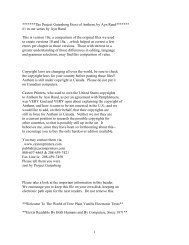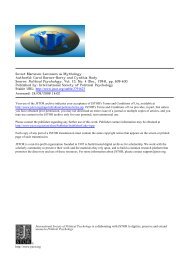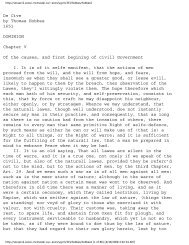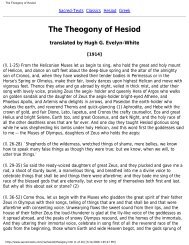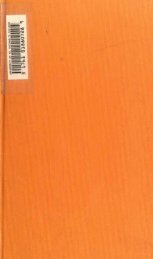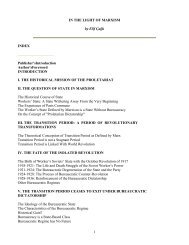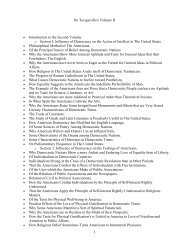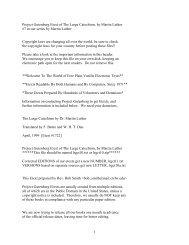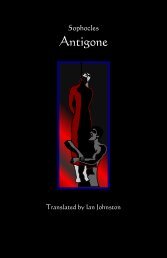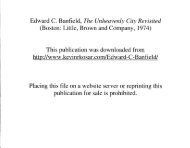Thomas Jefferson: A Manual of Parliamentary Practice
Thomas Jefferson: A Manual of Parliamentary Practice
Thomas Jefferson: A Manual of Parliamentary Practice
You also want an ePaper? Increase the reach of your titles
YUMPU automatically turns print PDFs into web optimized ePapers that Google loves.
<strong>Thomas</strong> <strong>Jefferson</strong>: A <strong>Manual</strong> <strong>of</strong> <strong>Parliamentary</strong> <strong>Practice</strong><br />
When an essential provision has been omitted, rather than erase the bill, and<br />
render it suspicious, they add a clause on a separate paper, engrossed and called a<br />
ryder, which is read and put to the question three times. Elsynge's Memorials 59. 6<br />
Grey 335. 1 Blackst. 183. For examples <strong>of</strong> ryders see 3 Hats. 121, 122, 124, 126. Every one<br />
is at liberty to bring in a ryder without asking leave. 10 Grey 52.<br />
It is laid down as a general rule, that amendments proposed at the second reading shall be<br />
twice read, and those proposed at the third reading thrice read; as also all amendments from<br />
the other House. Town. col. 19, 23, 24, 25, 26, 27, 28.<br />
It is with great, and almost invincible reluctance, that amendments are admitted at this<br />
reading, which occasion erasures or interlineations. Sometimes a proviso has been cut <strong>of</strong>f from<br />
a bill; sometimes erased. 9 Grey 513.<br />
This is the proper stage for filling up blanks; for if filled up before, and now altered by erasure,<br />
it would be peculiarly unsafe.<br />
At his reading the bill is debated afresh, and for the most part is more spoken to, at this time,<br />
than on any <strong>of</strong> the former readings. Hakew. 153.<br />
The debate on the question whether it should be read a third time has discovered to its<br />
friends and opponents the arguments on which each side relies, and which <strong>of</strong> these appear to<br />
have influence with the House; they have had time to meet them with new arguments, and to<br />
put their old ones into new shapes. The former vote has tried the strength <strong>of</strong> the first opinion<br />
and furnished grounds to estimate the issue; and the question now <strong>of</strong>fered for its passage, is<br />
the last occasion which is ever to be <strong>of</strong>fered for carrying or rejecting it.<br />
When the debate is ended, the Speaker, holding the bill in his hand, puts the question for its<br />
passage, by saying, "Gentlemen, all you who are <strong>of</strong> opinion that this bill shall pass, say aye,"<br />
and after the answer <strong>of</strong> the ayes, "All those <strong>of</strong> the contrary opinion say no." Hakew. 154.<br />
After the bill is passed, there can be no further alteration <strong>of</strong> it in any point. Hakew. 159.<br />
SEC. XLI.<br />
DIVISION OF THE HOUSE.<br />
THE affirmative and negative <strong>of</strong> the question having been both put and answered, the Speaker<br />
declares whether the yeas or nays have it by the sound, if he be himself satisfied, and it<br />
stands as the judgment <strong>of</strong> the House. But if he be not himself satisfied which voice is the<br />
greater, or if, before any other member comes into the House, or before any new motion<br />
made (for it is too late after that) any member shall rise and declare himself dissatisfied with<br />
http://www.constitution.org/tj/tj-mpp.htm (48 <strong>of</strong> 70) [4/14/2008 6:37:46 PM]



